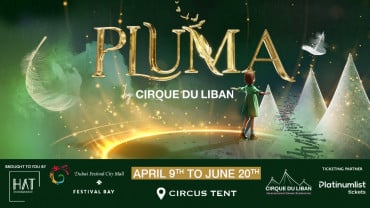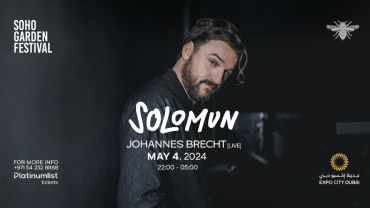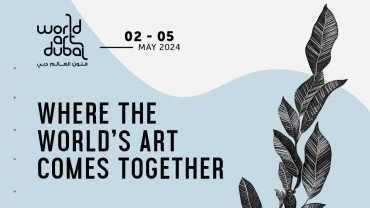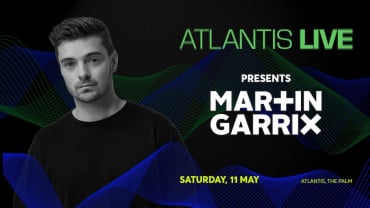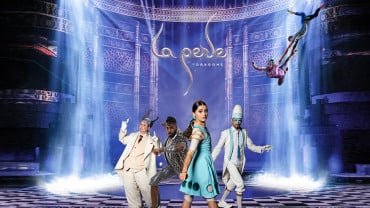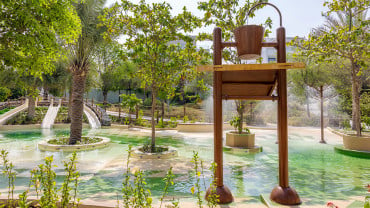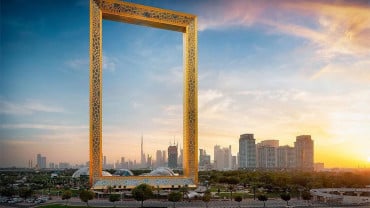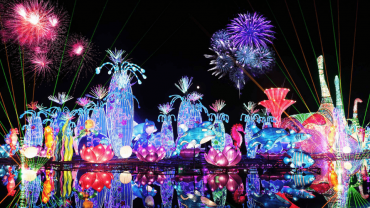An unimaginable musical experience.
4 guitarists exploring and pushing the boundaries of classical/contemporary music from around the globe.
The internationally acclaimed Dublin Guitar Quartet are set to perform in our candle-lit One & Only Royal Mirage Ball Room.
ABOUT DUBLIN QUARTET
Brian Bolger, Chien Buggle, Patrick Brunnock, Tomas O’Durcain
The Dublin Guitar Quartet are internationally recognized as one of the most dynamic and interesting musical performances. “With its singular approach and eclectic programming, the Dublin Guitar Quartet sets itself apart from the crowd with its one-of-a-kind dedication to exploring classical/contemporary music from around the globe. By taking its audiences on a journey through many styles and sounds, the Dublin Guitar Quartet offers an exciting concert experience that stretches the boundaries of its genre."
More info: www.dcc.ae
BEFORE & AFTER THE CONCERT:
Various dining possibilities are available and we recommend a mouth-watering 3 course dcc concert set menu for AED 260 only, at the Beach Bar & Grill at One & Only Royal Mirage. For dining reservations, call +971 4 399 9999.
ALL INFOS & COMPETITIONS:
Take part in our competitions on Instagram @dubaiconcertcommittee!
PROGRAMME:
Gongon - William Kanengiser
Chimurenga - Dave Flynn
Book of Leaves - Rachel Grimes
Saxophone Quartet - Philip Glass
Interval
Aheym - Bryce Dessner
Songs in Honour of the Virgin Mary - Urmas Sisask
Changing the Guard - Nikita Koshin
Quartet - Marc Mellits
Gongon - William Kanengiser
The DGQ have had the opportunity to perform with LAGQ founding member Bill Kanengiser on a number of occasions. The most notable of which is a premier performance of ‘How Little You Are’ for twelve guitarists and choir, in Austin Texas by composer Nico Muhly. Gongon is the only piece written by Kanengiser and the composer was good enough to send a package of crocodile clips, matchsticks and paperclips that the DGQ must attach to their strings in order to recreate the gong sounds that define Javanese Gamelan music.
Chimurenga (Homage to Thomas Mapfumo) (2000) - Dave Flynn
The original line up of the Dublin Guitar Quartet included David Flynn. While a member, he wrote Chimurenga, a cheerful work, whose title is the Ndeble word for revolution and refers specifically to the struggle for liberation in Zimbabwe during the 1970s. It evokes a sunlit world of dusty streets and sleepy commerce. What starts as a solo jig, transforms into a dry twang of African township guitars, the shuffling irresistible beat supporting damped electric tone. As the dancers tire, the players change to percussive noises, first dry strumming, then tapping on their instruments and finally clapping while the top line returns to the opening solo.
Composer’s note:
“Chimurenga,” meaning “struggle,” is a form of Zimbabwean pop music developed by Thomas Mapfumo in the late 1970s. Mapfumo and his music were an important factor in securing the independence of Zimbabwe in 1980. Thomas Mapfumo’s music has had a great influence on me, and this piece is an homage to him and tries to recreate the Chimurenga sound in the form of a Guitar Quartet. At various points the guitarists must mute the strings in imitation of Chimurenga guitar style which itself is in imitation of the mbira sound. Towards the end of the piece three of the four guitarists create percussive sounds by tapping the guitars’ bodies, strumming muted string, and hand claps. The piece may be played using any type of guitars: nylon string, steel string, or electric.
Book of Leaves - Rachel Grimes - USA
The Dublin Guitar Quartet’s musical director Brian Bolger has been a fan of the ‘post-rock’ genre since it’s emergence in the late 1990s. Minimalist influenced rock by the likes of Slint, Don Caballero and Aerial M have influenced the direction of the DGQ. A particular favourite is the now disbanded ‘Rachels’ from Kentucky. With instrumentation including strings, piano and even a suite for harpsichord, 20th century classical music was the primary influence on this group. The DGQ were delighted to see that Rachel Grimes continues her work as a composer and they set about communicating with the composer and collaborating on a transcription of her work for solo piano ‘Book of Leaves’.
Saxophone Quartet (1995) - Philip Glass - USA
“The Dublin Quartet’s transcription and performance of Glass’s 'Saxophone Quartet' was magical.”
- San Diego Tribune
“I practically followed John Coltrane around, whenever he played in a club in New York,'' Mr. Glass recalled. ''Coltrane reintroduced the soprano saxophone to jazz, and I now have three soprano saxophones in the ensemble - where do you think I heard that sound?’' - Philip Glass
The Saxophone Quartet is very unique within Glass’ oeuvre. Listeners who mistakenly dismiss Philip Glass’ music as flat and repetitive will be surprised by the frenetic, syncopated and unashamedly Jazzy style of the second and forth movements. Here, Glass embraces the musical history associated with the saxophone and composes a work with echoes Coltraine, Monk, Ellington and Gershwin.
In 2014, Philip Glass released the Dublin Guitar Quartet’s recording of their transcriptions of his string quartets on his own record label Orange Mountain Music. The DGQ have now begun to adapt other works from his oeuvre. Their Saxophone Quartet transcription was premiered at Ben Verdery’s ‘Innovation of Transcription’ guitar marathon at 92nd St Y, NY in February, 2017.
Glass composed his Concerto for Saxophone Quartet and Orchestra at the behest of the Rascher Saxophone Quartet. The group requested a piece that could be performed with or without orchestra. Glass was aware that if he wrote began with the orchestral version first the resulting reduction would be too complicated for four players, so he wrote the piece first for the quartet only. The piece premiered for saxophone quartet alone in July 1995 in Germany’s and the the version for saxophone quartet with orchestra premiered in September of that year in Stockholm. In their transcription the DGQ make much use of their 8-string guitars in order to achieve the upper and lower ranges unavailable on a standard six-string.
Aheym (Homeward) (2009) - Bryce Dessner - USA
With it’s raucous unison opening and intense final bars Bryce Dessner’s background as guitarist with rock group The National is clearly evident. This work was originally composed for string quartet but the success of the Dublin Guitar Quartet’s transcription confirms the under lying guitaristic impulse at work in the piece. Fortissimo, unison strumming and accented ‘down stroke’ picking over a looping bass line are common rock idioms which work perfectly when recast for four guitars.
Composer’s note:
Aheym means ‘homeward’ in Yiddish, and this piece is written as musical evocation of the idea of flight and passage. As little boys, my brother and I used to spend hours with my grandmother, asking her about the details of how she came to America. (My father’s family were Jewish immigrants from Poland and Russia). She could only give us a smattering of details, but they all found their way into our collective imagination, eventually becoming a part of our own cultural identity and connection to the past. In her poem “Di rayze aheym,” the American-Yiddish poet Irena Klepfisz, a professor at Barnard in New York and one of the few child survivors of the Warsaw Ghetto, writes: “Among strangers is her home. Here right here she must live. Her memories will become monuments." Aheym is dedicated to my grandmother, Sarah Dessner. - Bryce Dessner
Changing of the Guard - Nikita Koshkin - Russia
This work brilliantly evokes both the regimentation and violence of war and the precise choreography of the changing of the guard outside the Kremlin, Moscow. With it’s mechanical rhythms and chromatic dissonances the influence of Shostakovich is very apparent. This is one of the few important works for guitar quartet and has been performed by most guitar quartets but, the DGQ with their tendency towards rock techniques, further emphasise the aggressive character and potential for volume by choosing strumming and plectrum techniques at climatic points throughout the piece.
Quartet (2015) - Marc Mellits - USA
“Quartet” was commissioned by the Syracuse Society for Chamber Music for the Dublin Guitar Quartet.
“Quartet” was written in the fall of 2015 (and finished on Friday the 13th of November). As the season grew, more and more leaves began to fall from the trees. On the shores of lake Michigan, I noticed many varieties of trees shedding their leaves, all falling randomly into a great mix of different types on the grass. I found it beautiful how so many different types of trees could create such a beautiful patchwork of leaves. With the deep blue lake in the backdrop, the leaves created an interesting optical illusion where they stopped looking like leaves on the ground and almost floated in front of my eyes.
The sound of four Guitars all playing in close proximity to one another creates an interesting sound world of vibration and resonation. I tried to create music that emanates from this patchwork of vibrating strings. Much of the music of “Quartet” creates an “auditory illusion,” which could be considered the aural equivalent of an optical illusion. Often the individual instruments themselves have only a part of the overall line or texture. When combined, the patterns they play connect and create new patterns that can only be revealed when everyone plays at the same time. The rhythmic stresses that the individual instruments play themselves are often not the complete stresses that are heard when all four Guitars are playing together. An “auditory illusion” is thus created: what we hear is not always what we think the musicians are playing. In this way, the musicians become part of the overall machine of sound, creating a sonorous backdrop on which melodic material floats on top and weaves within.
Composer Biographies.
William Kanengiser is recognized as one of the USA’s finest classical guitarists. He is a founder member of the Los Angeles Guitar Quartet, a composer and arranger. He is known for developing a unique and individual repertoire for his instrument, ranging from arrangements of Mozart, Handel and Bartok, to his own innovative excursions into the music of Eastern Europe and the Caribbean.
Nikita Koshkin (1956) is a Russian classical guitarist and composer. His early influences included Stravinsky, Shostakovich and Prokofiev. He also had an interest in rock music. Koshkin first came to prominence with his suite for solo guitar "The Prince's Toys”. Besides writing works for solo guitar, Koshkin has composed guitar-ensemble music as well; in addition to numerous pieces for guitar duo, he has written two works for guitar quartet: Changing the Guard (1994), and Suite for Four Guitars (composed for the Georgia Guitar Quartet, 2007).
Urmas Sisask (1960) One of the major inspirations for his music is astronomy. Based on the trajectory of the planets in the solar system , he created the "planetal scale”. He studied composition under René Eespere at the Tallinn Conservatoire in Estonia and graduated in 1985. He soon absorbed himself in his interest for early music and Gregorian chant. Sisask has gained international recognition primarily as a choral composer although the Starry Sky Cycle for piano was among the first pieces by him to attract attention. Apart from choral works Urmas Sisask has written chamber, instrumental and orchestral music. He has developed his own, expressive language with an idiom closer to the old authentic church modes than to the tensions of the major-minor system. Being also fond of the suggestibility of recurrent phrases he has sometimes been described as a musical shaman.
Philip Glass (1937) is an American composer. He is considered one of the most influential music makers of the late 20th century. His music is also often described as minimal music, along with the work of the other minimalists, Terry Riley and Steve Reich. Glass has distanced himself from the minimalist label, describing himself instead as a composer of "music with repetitive structures". Though his early mature music shares much with what is normally called minimalis, he has since evolved stylistically. Currently, he describes himself as a "classicist", pointing out that he is trained in harmony and counterpoint and studied such composers as Franz Schubert, Johann Sebastian Bach and Wolfgang Amadeus Mozart with Nadia Boulanger. Glass is a prolific composer: he has written operas, musical theatre works, ten symphonies, eleven concertos, solo works, chamber music including string quartets and instrumental sonatas, and film scores. Three of his film scores have been nominated for Academy Awards.
Bryce Dessner
Bryce Dessner is one of the most sought-after composers of his generation, with a rapidly expanding catalog of works commissioned by leading ensembles. Known to many as a guitarist with The National, he is also active as a curator – a vital force in the flourishing realm of new creative music.
His orchestral, chamber, and vocal compositions have been commissioned by the Los Angeles Philharmonic, Ensemble Intercontemporain, Metropolitan Museum of Art (for the New York Philharmonic), Kronos Quartet, BAM Next Wave Festival, Barbican Centre, Edinburgh International Festival, Sydney Festival, eighth blackbird, Sō Percussion, New York City Ballet, and many others. He has worked with some of the world’s most creative and respected musicians and visual artists, including Philip Glass, Steve Reich, Johnny Greenwood, Justin Peck, Hiroshi Sugimoto and Matthew Ritchie, among others.
Rachel Grimes is a pianist, composer, and arranger based in Kentucky. She is a founding member of the ground-breaking indie-rock chamber ensemble Rachel’s, with whom she toured and released six albums (Quarterstick / Touch & Go).
Heralded “one of American independent music’s few truly inspired technicians” by WIRE magazine, Rachel Grimes is a pianist, composer, and arranger based in Kentucky. She has toured worldwide as a solo pianist, and her work has been performed by such artists as Longleash, Amsterdam Sinfonietta Trio, Dublin Guitar Quartet, Portland Cello Project, Cicada, Orchestra Kandinskij, Borusan Quartet and Önder sisters, Orchestra Enigmatic, and the Louisville Orchestra. Rachel has performed at some of the world’s most diverse music festivals including Ecstatic Music Festival, Substrata, All Tomorrow’s Parties, P Festival (Taiwan), CrossLinx (Netherlands), Approximation Festival (Germany) and Big Ears in Knoxville, TN. Collaborators include Loscil, SITI Company, astrïd and Sylvain Chauveau, Chris Wells, Scott Moore, Jacob Duncan and Matthew Nolan. Solo releases: The Clearing (Temporary Residence – May 2015), Book of Leaves, Marion County 1938, and Compound Leaves as well as contributions to the albums of fellow artists like Watter, Christopher Tignor, Seluah, Joan Shelley, Nathan Salsburg, Christian Frederickson, Tara Jane O’Neil, Helen Money, R. M. Hubbert, and the Frames. She is a member of Louisville rock band King’s Daughters & Sons (Chemikal Underground).
David Flynn
Dublin-born Dave Flynn is a composer and guitarist equally at home in the worlds of classical, folk and rock music. His work, praised for its ‘’power and grittiness’’ by The New York Times, defies and challenges the concept of musical genre.
Currently Artistic Director of the Clare Memory Orchestra, Flynn has been commissioned by RTÉ, Huddersfield Contemporary Music Festival, the Arts Council of Ireland, the Masters of Tradition Festival and the Contemporary Music Centre. His work has been performed in New York’s Museum of Modern Art; The Kremlin, Moscow; Centre Culturel Irlandais, Paris; Dvorak Hall, Prague; Brisbane Conservatory of Music and Ireland’s National Concert Hall and at the Edinburgh Fringe Festival, City of London Festival, Guitar Festival of Ireland, EBU Folk Festival and the Secret Festival, Sweden
Marc Mellits
Composer Marc Mellits is one of the leading American composers of his generation, enjoying hundreds of performances throughout the world every year, making him one of the most performed living composers in the United States. From Carnegie Hall and the Kennedy Center, to prestigious music festivals in Europe and the US, Mellits’ music is a constant mainstay on programs throughout the world. His unique musical style is an eclectic combination of driving rhythms, soaring lyricism, and colorful orchestrations that all combine to communicate directly with the listener. Mellits' music is often described as being visceral, making a deep connection with the audience. “This was music as sensual as it was intelligent; I saw audience members swaying, nodding, making little motions with their hands” (New York Press). He started composing very early, and was writing piano music long before he started formal piano lessons at age 6. He went on to study at the Eastman School of Music, Yale School of Music, Cornell University, and Tanglewood. Mellits often is a miniaturist, composing works that are comprised of short, contrasting movements or sections. His music is eclectic, all-encompassing, colourful, and always has a sense of forward motion.
Mellits' music has been played by major ensembles across the globe and he has been commissioned by groups such as the Kronos Quartet, Orpheus Chamber Orchestra, Royal Concertgebouw Orchestra (Holland), Duo Assad, Bang On A Can All-Stars, Eliot Fisk, Canadian Brass, Nexus Percussion, Debussy Quartet, Real Quiet, New Music Detroit, Four-In-Correspondence (National Symphony Orchestra), Musique En Roue Libre (France), Fiarì Ensemble (Italy), Percussions Claviers de Lyon (France), Third Coast Percussion, Talujon, the Society for New Music, Syracuse Symphony Orchestra, and the Albany Symphony's Dog's Of Desire. Additionally, Mellits’ music has been performed, toured, and/or recorded by members of the Detroit Symphony, Atlanta Symphony, Boston Symphony, Chicago Symphony, Minneapolis Symhony, Brooklyn Philharmonic, eighth blackbird, Chamber Music Society of Lincoln Center, New Millenium Ensemble, Da Capo Chamber Players, and the American Modern Ensemble, among many others.
On film, Mellits has composed numerous scores, including the PBS mini-series “Beyond The Light Switch” which won a 2012 Dupont-Columbia award, the most prestigious award in documentaries. Mellits also directs and plays keyboards in his own unique ensemble, the Mellits Consort. He was awarded the prestigious 2004 Foundation for Contemporary Arts Award. On CD, there are over 50 recorded works of Mellits' music that can be found on Black Box, Endeavour Classics, Cantaloupe, CRI/Emergency Music, Santa Fe New Music, Innova, & Dacia Music. Marc Mellits is an Assistant Professor of music at the University of Illinois at Chicago. He lives in Chicago with his wife and two daughters, and spends significant time in Romania.
Read more



